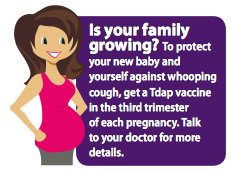How to protect your newborn from whooping cough
With coughing so severe it could crack your baby’s ribs, pertussis (whooping cough) can be life-threatening to children under the age of one. But, your baby doesn’t get his first pertussis vaccine until he is 2 months old, so how do you protect him from this horrible and life-threatening disease in the first few months of his life?
The answer is easy and it doesn’t even require you stick your newborn with any needles. You can get the Tdap vaccine, the vaccine that protects against tetanus, diphtheria, and (acellular) pertussis, during pregnancy and your newborn will be born protected from whooping cough until he is old enough to get the vaccine at two months.
When you get the Tdap vaccine during pregnancy, your body makes protective antibodies to the contents in the vaccine. These antibodies pass through the umbilical cord into the baby’s body and provide short-term protection against diseases once the baby is born. Because the antibodies are highest a few weeks after you are given the injection, it is recommended by the Centers for Disease Control and Prevention (CDC) that pregnant women be given Tdap between 27 and 36 weeks of pregnancy. This will guarantee the highest level of protection to the baby after birth.
But, the antibodies don’t last in your child for more than a few months, therefore it is still important to have your child vaccinated with the DTaP vaccine on schedule. It is also important to understand that because these antibodies wane over time, that you will need to get vaccinated against whooping cough during each pregnancy. So, what’s the difference between these two vaccines mentioned? Well, there are two vaccines that offer protection from tetanus, diphtheria, and pertussis.
- DTaP – given to children 2 months – 6 years old
- Tdap – given to everyone 11 years old and older, including pregnant women
Now, one more thing: If you have never been vaccinated with either of these vaccines and you are pregnant, you must not get the vaccine during your pregnancy. However, be sure to get the vaccine immediately after you give birth. It will be about two weeks before your body has made ample antibodies and you are considered protected. This is important for you to do not only for your own health, but for the health of your children. Did you know that about 30-40% of babies who get whooping cough get it from their mothers?1
And another benefit: the antibodies that you have generated may pass into your baby through breast milk. Added protection! Protect yourself and your babies from whooping cough.
The CDC estimates an average of 3,055 cases of infant pertussis cases including more than 19 deaths each year.2 They also estimate that about 600,000 adults get pertussis each year and could easily pass it on to unprotected infants and children.2
Mothers, take your child’s health into your own hands! Give your children the gift of protection, and it’s even better when you can take the needle for them. 🙂
And because it’s Mother’s Day, I have some super special news: We are adding another little “germ factory” to our family! And I plan on getting the Tdap vaccine in a few months because we are due in early November! I’m getting the vaccine, and if you’re pregnant, so should you!
Have a very happy Mother’s Day, mommas!! You all are amazing and you deserve it!

Resources:
- The Centers for Disease Control and Prevention. www.cdc.gov
- The Baby Center. The Tdap Vaccine: Protecting Yourself and Your Baby From Whooping Cough.
Photos Courtesy of the CDC.
One thought on “How to protect your newborn from whooping cough”
Comments are closed.




Pregnant women should receive a dose of Tdap during each pregnancy (27-36 weeks). I don’t see any data stating that if a pregnant woman has never received a DTaP or Tdap in her past, she should NOT receive a Tdap during pregnancy. I believe the recommendation is if a pregnant woman does not receive Tdap during her pregnancy and has never received a Tdap in the past, she should receive a Tdap immediately post-partum. Glad to see this blog!